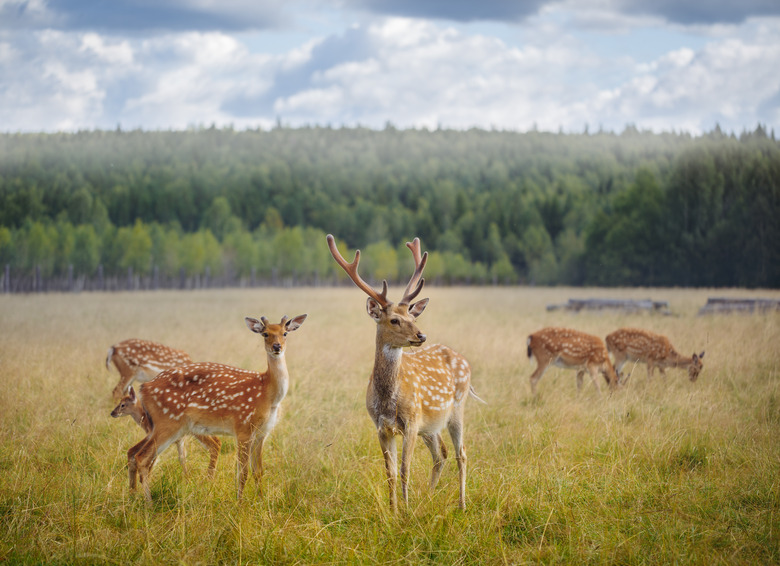Deer Resistant Plants In Wisconsin
As if a short growing season, tornadoes and a hot, humid summer weren't enough, Wisconsin gardeners also have to deal with lots of hungry critters, the largest of which are deer. Even urban gardeners need to familiarize themselves with deer-resistant plants if they want healthy landscape or plentiful harvest in Wisconsin. The plants deer won't eat populate many lists, but it's important to note that hungry deer will eat almost any plant life if their favorite edibles aren't available to them.
Deer and the Landscape
Deer lived in Wisconsin before residential landscaping began. Early settlers removed deer's natural predators, wolves, and then created thousands of acres of cultivated pastures, making grazing a breeze instead of a challenge. The resulting expanding herds pushed out of rural woodlands into urban areas.
According to the Wisconsin Humane Society (headquartered in Milwaukee where deer threaten city garden plots), fences, strobe lights, strips of mylar, noise and chemical repellents can make a backyard less attractive.
Plants Deer Won't Eat
With the caveat that hungry deer will eat anything when desperate, there are certain plants that they'll pass over in favor of other vegetation that is more palatable.
Deer Resistant Herbs
Aromatic herbs to discourage deer from grazing in urban and suburban gardens include:
- Garlic
- Chives
- Onion
- Lavender
- Sage
- Honeybush
- Thyme
Deer also dislike catnip and spearmint, but these members of the mint plant family (Lamiaceae) can be invasive and should be kept under control.
Deer Resistant Flowers
Plant these in your flower garden to deter deer from munching on them:
- Daffodils
- Chrysanthemums
- Perennial Oriental poppies
- Annual zinnias
Deer Resistant Flowering Shrubs
Perennial shrubs that aren't attractive to deer include:
- Bottle brush
- Rhododendron
- Rugosa roses
- Wild lilac
Deer Resistant Evergreens
Evergreen trees that are distasteful to deer include:
- Douglas fir
- Blue spruce
Native Plants Deer Won't Eat
Home vegetable and flower gardens, and the trees and shrubs that surround them, offer well-fertilized, well-watered, convenient grazing for deer. Native plants survive on less, so they offer a less lavish meal.
Native Perennial Plants
Incorporate these native perennials that deer find distasteful into your landscape:
- Black-eyed Susan
- Purple and prairie coneflowers
- Eastern red columbine
- Butterflyweed
- Golden tickseed
- Yarrow
- Spiderwort
Deer will also avoid wild bergamot, thistles and prairie goldenrod, but these are aggressive growers that must be contained; many municipalities deem thistles and goldenrod "noxious," or invasive, weeds whose cultivation is illegal.
Native Wetland Plants
Property owners who have wetland areas, ponds, or rain gardens in their landscapes may see many deer because the water attracts these creatures. Consider growing these native wetland plants that deer may not be tempted to nibble when they drink:
- Virginia iris
- American lotus
- Cardinal flower
- American eelgrass
Native Deer Resistant Evergreens
The Lady Bird Johnson Wildflower Center has these and more suggestions for the gardener who wants to use deer-resistant native plants, including deer resistant evergreens:
- Junipers, which are uncomfortable in the mouth
- Chokeberry shrubs, which are unpalatable
- Barberry
Areas of High Deer Concentrations
Small greenhouses and nurseries dot the Wisconsin country side; many owned by accomplished horticulturists or experienced staff. From Winter, a town in the far northern part of the state where the bears may outnumber the people and the deer outnumber both, Winter Greenhouse recommends these plants as some of the most deer-resistant choices:
Deer Resistant Perennial Flowers
- Tiger lilies
- Peonies
- Heather
- Lupines
- Blanketflower
- Moss pinks
Deer Resistant Annual Flowers
- Wax begonias
- Coleus
- Salvias
- Marigolds
- Nasturtiums
- Morning glories
Using Plants as Protection
In spring, when leaves and branches are most tender, surround deer-susceptible plants with others that are less attractive, such as:
- Lily of the valley
- Grape hyacinth
- Winter aconite
- Glory-of-the-snow
- Common snowdrop
- Siberian squill
- Spreading spirea shrubs
